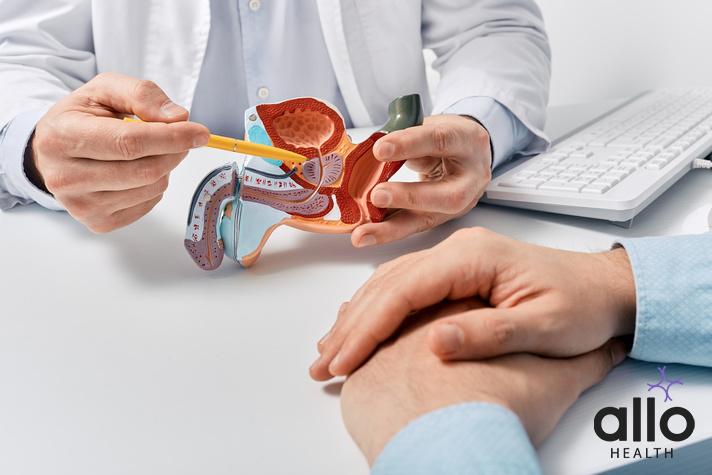How to Maintain Erection for 30 Minutes?

Allo Health is dedicated to personalized well-being, offering support and trusted information tailored to individual health goals. The platform emphasizes human-generated content, led by a distinguished medical team of experts, including physicians and sexual health specialists. Their commitment to credibility involves rigorous fact-checking, authoritative research, and continuous updates to ensure accurate, up-to-date information. Allo Health's unique approach goes beyond conventional platforms, providing expert-led insights and a continuous commitment to excellence, with user feedback playing a crucial role in shaping the platform's authoritative voice.

Dr. Aditi completed her undergraduate medical education at AJIMS, Mangalore, after which she worked in multi-speciality hospitals with COVID patients and in the Pain and Palliative medicine department. Driven by her experiences, she developed a keen interest in psychiatry. Dr. Aditi believes that mental health is just as, if not more important, than physical health.
Why This Was Upated?
Our experts continually monitor the health and wellness space, and we update our articles when new information became available.
Updated on 23 May, 2024
- Article was updated as part of our commitment to diversity, equity, and inclusion.

"The following blog article provides general information and insights on various topics. However, it is important to note that the information presented is not intended as professional advice in any specific field or area. The content of this blog is for general educational and informational purposes only.
Book consultation
The content should not be interpreted as endorsement, recommendation, or guarantee of any product, service, or information mentioned. Readers are solely responsible for the decisions and actions they take based on the information provided in this blog. It is essential to exercise individual judgment, critical thinking, and personal responsibility when applying or implementing any information or suggestions discussed in the blog."
Maintaining an erection during sexual activities can be challenging for many, but with the right approach, it’s achievable. This article will guide you how to maintain erection for 30 minutes through simple and practical steps to enhance your sexual performance and overall sexual health.
Importance of Maintaining an Erection
Maintaining an erection is vital for several reasons, particularly in the context of sexual activities and overall sexual health. It plays a crucial role not only in sexual satisfaction but also in physical and emotional well-being. Here’s how:
- Enhance Sexual Performance and Satisfaction: A firm erection is essential for fulfilling sexual activities. It allows for a more enjoyable sexual experience and sexual satisfaction for both partners.
- Improve Confidence and Quality of Life: The ability to maintain an erection can significantly affect a person’s confidence and self-esteem. This, in turn, impacts their quality of life and sexual life.
- Prevention of Sexual Dysfunction: Regularly maintaining an erection can help prevent concerns like erectile dysfunction and premature ejaculation, common concerns affecting many middle-aged men and others.
- Cardiovascular Health Indicator: Good erectile health is often linked with good cardiovascular health. Erections depend on healthy blood flow and blood vessels, making them an indicator of overall cardiovascular health.
- Improve Blood Circulation and Nerve Function: An erection is a complex interplay of blood circulation and nerve function. Maintaining an erection ensures that these systems are functioning properly, which is important for overall health.
- Maintain Relationship Health: A satisfying sex life, influenced by the ability to maintain an erection, can strengthen intimate relationships and improve emotional connections.
- Maintain Testosterone Levels: Regular sexual activity, aided by the ability to maintain an erection, can help maintain healthy testosterone levels. This hormone is vital for sexual function, sex drive, and overall physical health.
- Stress Reduction: Sexual activities, including those requiring a maintained erection, can reduce stress levels and enhance mental health.
- Proactive Health Management: Addressing erection difficulties encourages individuals to seek advice from healthcare providers, leading to early detection and management of potential health conditions like cardiovascular disease or diabetes.
Maintaining an erection is not just about sexual prowess; it’s a key factor in a person’s overall health and well-being. It impacts sexual, physical, and emotional health, playing a crucial role in one’s sexual and general life quality.
Factors Affecting Erection Duration
Several factors can affect erection duration, impacting overall sexual performance and sexual health. Understanding these factors is crucial for maintaining a healthy sex life and addressing any concerns related to sexual dysfunction.
- Poor Blood Circulation and Blood Flow: The quality of blood flow to the penis is essential for maintaining an erection. Poor circulation can lead to weaker or shorter-lasting erections.
- Erectile Dysfunction (ED): This is the most direct condition affecting erection duration. ED is characterized by the inability to achieve or maintain a firm erection for sexual activity. It can be caused by concerns with blood flow, nerve function, or psychological factors.
- Premature Ejaculation: While primarily affecting ejaculation control, it can also impact erectile duration and sexual confidence, subsequently affecting erectile function.
- Medication Side Effects: Some prescription drugs can have side effects that include reduced erection duration or erectile dysfunction.
- Prostate Health Concerns: Conditions like prostate cancer or enlarged prostate can affect both urinary function and erection duration.
- Cardiovascular Health: A healthy heart and blood vessels are vital for proper erectile function. Cardiovascular diseases can impair blood flow, affecting erection duration.
- Pelvic Floor Muscle Weakness: Strong pelvic floor muscles, enhanced through exercises like kegel exercises, can improve the ability to maintain an erection.
- Low Testosterone Levels: This hormone plays a key role in sexual drive and erectile health. Low testosterone levels can negatively impact erection duration and sex drive.
- Unhealthy Diet: Unhealthy diet can affect erection duration. A diet that supports cardiovascular and overall health can improve blood flow and erectile function.
- Stress Levels and Mental Health: High stress levels and conditions like sexual performance anxiety can interfere with sexual arousal and erection duration.
- Alcohol Intake and Smoking: Excessive alcohol consumption and smoking can have negative effects on blood flow and nerve function, impacting erections.
- Certain Health Conditions: Certain health conditions, particularly those affecting blood pressure, nerve function, and cardiovascular health, can influence erectile health.
- Insufficient Sexual Stimulation: Adequate and effective sexual stimulation is crucial for initiating and maintaining an erection.
By addressing these factors, individuals can work towards improving their erection duration and overall sexual experience. It’s essential to consult healthcare professionals for personalized advice, especially for those with specific health conditions or concerns.
How to Maintain Erection for 30 Minutes?

Maintaining an erection for around 30 minutes involves a combination of healthy lifestyle choices, exercises, and attention to both physical and mental health.
- Improve Blood Circulation: Enhanced blood flow is crucial for maintaining an erection. Regular aerobic exercise, like jogging or swimming, promotes cardiovascular health and better blood circulation.
- Pelvic Floor and Kegel Exercises: Strengthening the pelvic floor muscles through kegel exercises can lead to firmer and longer-lasting erections.
- Maintain Cardiovascular Health: Since erections depend on blood flow, maintaining heart health is vital. This involves regular cardiovascular exercises and monitoring blood pressure.
- Eat Healthy Diet: Eating healthy foods that improve blood flow and testosterone levels is beneficial. This includes fruits, vegetables, whole grains, and lean meats.
- Manage Stress Levels: High stress can lead to sexual dysfunction. Practicing mindfulness techniques and reducing stress can enhance sexual performance.
- Limit Alcohol Intake and Quit Smoking: Both alcohol and smoking can have negative effects on erectile function. Reducing alcohol consumption and quitting smoking can significantly improve sexual health.
- Consult a Healthcare Provider: If you have persistent erection difficulties or health conditions, a healthcare professional can provide advice and treatment options.
- Do Regular Exercise: Engaging in at least 30 minutes of exercise daily can improve overall blood flow and erectile health.
- Monitor Testosterone Levels: Testosterone plays a key role in sexual drive and erectile function. Maintaining healthy levels through physical activity and a proper diet is important.
- Address Sexual Health Conditions: Conditions like erectile dysfunction and premature ejaculation can be managed with the help of healthcare professionals.
- Try Herbal Remedies: Some herbal supplements are known to improve sexual function, but it’s important to consult with a healthcare provider before trying these.
- Sexual Stimulation Techniques: Focusing on effective sexual arousal methods can help in maintaining an erection during sex.
- Improve Sexual Experience: Open communication with your partner and exploring different aspects of sexual activities can enhance sexual satisfaction.
- Mindfulness and Relaxation: Techniques like meditation can help in reducing sexual performance anxiety, thereby improving erectile function.
Remember, these methods should be part of a consistent and healthy lifestyle. If you have concerns about sexual dysfunction or health conditions affecting your sexual life, it’s crucial to seek advice from a healthcare professional.
When to Consult a Healthcare Professional?

Consulting a healthcare professional is essential if you’re experiencing persistent difficulties in maintaining an erection, as it could indicate underlying health concerns. Here are key situations when you should seek medical advice:
- Recurring Erectile Dysfunction: If you frequently struggle to achieve or maintain a firm erection during sex, it may be a sign of erectile dysfunction.
- Cardiovascular Health Concerns: Erectile health is closely linked to the health of your blood vessels and heart. If you have symptoms or a history of cardiovascular disease, consulting a healthcare provider is crucial.
- Impact on Quality of Life: When erection difficulties start to affect your sexual life, personal relationships, or mental well-being, it’s important to seek professional guidance.
- Blood Flow and Blood Pressure Concerns: Problems with blood circulation or high blood pressure can contribute to erectile difficulties. Regular health check-ups can detect these concerns.
- After Trying Lifestyle Changes: If you’ve implemented healthier lifestyle choices, such as regular exercise, a healthy diet, reducing alcohol intake, and still face challenges, professional advice can help identify other underlying factors.
- Presence of Health Conditions: Certain health conditions, like diabetes or nerve function disorders, can affect erectile health. A healthcare professional can provide tailored advice and treatment options.
- When Stress Levels or Mental Health Concerns Are Involved: Stress and mental health play a significant role in sexual performance. If you’re experiencing high stress levels or anxiety, including sexual performance anxiety, professional support can be beneficial.
- Hormonal Imbalances: Low testosterone levels can impact your sex drive and erectile function. A healthcare provider can assess hormone levels and suggest appropriate treatments.
- If Considering Prescription Drugs or Herbal Remedies: Before using any prescription drugs or herbal remedies for erection difficulties, it’s important to consult with a healthcare professional to understand their potential effects and interactions with other medications.
- For Older or Middle-Aged Men: As you age, changes in sexual function are common. Healthcare professionals can provide guidance tailored to your age-related needs.
Remember, seeking help from a healthcare professional is a proactive step towards maintaining your sexual health and overall well-being. They can provide valuable insights, diagnostic tests, and effective treatment options for maintaining a healthy and satisfying sexual life.
Conclusion
Improving erection duration is not just about the sexual experience but also about overall health and wellbeing. By incorporating these tips into your life, you can enjoy a more satisfying sexual life. Remember, for any concerns or persistent difficulties, consulting a healthcare professional is always the best course of action.
Most Asked Questions
-
What are the best exercises for maintaining a firm erection?
Regular cardiovascular exercises like walking or jogging can improve your heart health and blood flow, which is essential for a firm erection. Also, pelvic floor exercises, commonly known as Kegel exercises, strengthen the muscles that help maintain an erection during sex.
-
How does diet impact erectile function?
A healthy diet plays a significant role in maintaining good blood circulation and overall sexual health. Foods rich in antioxidants, vitamins, and minerals support the health of your blood vessels, contributing to better erectile function. It’s also advised to limit alcohol intake as it can have negative effects on your ability to maintain an erection.
-
Can stress affect my ability to maintain an erection for 30 minutes?
Yes, stress can significantly impact your sexual performance. High stress levels can interfere with sexual arousal and may lead to difficulties in maintaining an erection. Practicing mindfulness techniques and managing stress through relaxation activities can be beneficial.
-
Should I consult a healthcare provider if I have difficulty maintaining an erection?
Definitely. If you’re consistently experiencing erection difficulties, it’s important to talk to a healthcare professional. They can provide guidance on managing any underlying health conditions, suggest lifestyle changes, and discuss treatment options if necessary, ensuring your sexual health and overall well-being are taken care of.






































